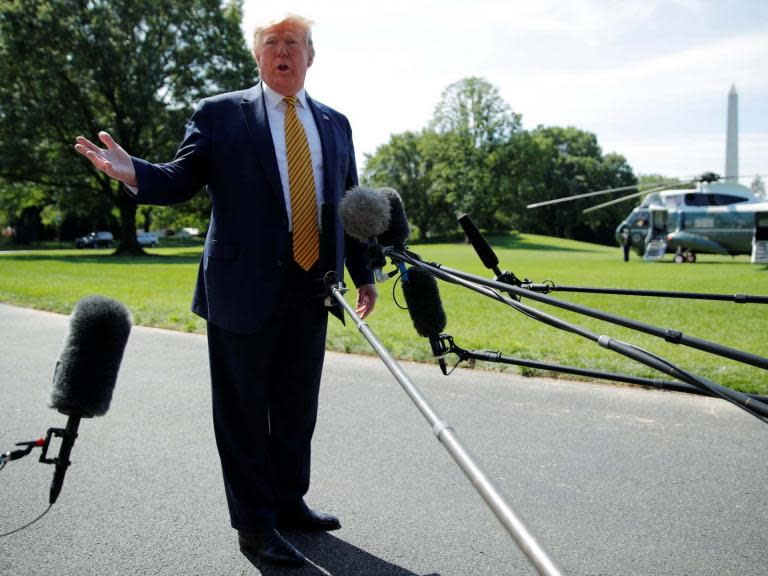Trump's America is in better shape than Brexit Britain. That's why I decided to move
I’m a British Muslim who recently chose Trump’s America over Brexit Britain when I moved to Washington DC. And I don’t regret my decision.
Trump's America is in much better shape than Brexit Britain. The US economy and stock market is booming, while the UK is delaying the inevitable crash.
American society has a resilience and openness that Brits envy. Most importantly, US democracy is still functioning, meaning that there is a clear future — with or without Trump. However, Britain's crisis is about the failure of democracy: an inconvenient referendum result that dominates the airwaves, and a parliament powerless to end the disarray. That's why I crossed the pond last year, and haven't looked back.
I’ve lost count of the number of people confused by my decision. Family, friends and colleagues back in London can’t believe that me, a spiritual Muslim who not only is proud of my roots but flaunts them in my art, has found success and happiness in Trump’s America. Not only that, but my American dream has become part of my art, with the White House fusing with Quranic calligraphy in one of my works.
At the political level, both countries are struggling to provide inclusive leadership for all their citizens. Islamophobia and other forms of racism are issues for both Americans and Brits (as well as many other countries in the world).
But the difference is not in the politics — it’s in the societies.
American society has been so multicoloured for so long that in my experience, everyday life as a brown person is so much easier. I am ethnically ambiguous as soon as I land in Dulles International Airport: I could easily pass as Latino, or even Native American. Perhaps Italian. Or any one of the dozens of other ethnicities from all over the world that have made America home.
Britain, on the other hand, is a society that is still white by default. Yes, there are exceptions in public life that go against this, but the subtle yet obvious hierarchies that govern British life cast a long shadow onto the streets of Britain.
This is even more pronounced in my industry, the arts. The British arts scene is shamelessly elitist, meaning that an artist of my background is — when he is even allowed into the industry — a novelty. Public funding for the arts does little to help the situation, since institutions like the Arts Council are unsurprisingly staffed by those who mirror the industry they serve.
This means that in the UK it is very difficult for me to build clients and make a living. In four years in the UK, I only ever had one gallery show. However, in the 18 months I’ve spent in America, I have had 12 — almost one a month.
Part of this is because my clientele — predominantly Muslims — are very different in each country. British Muslims are not only racially disadvantaged but also socio-economically. Much of the reason for this is historical: many British Muslims descended from colonial immigrants, where low-skilled labourers (who were often formerly farmers) were brought to the UK to work in industries like textiles. As those industries shut down, them and their children’s prospects went from bad to worse.
Muslim immigration to America, however, has historically been very different. So-called “brain drain” emigration from lower and middle income countries means that many American Muslim families have been university-educated for two generations or more.
All of this has created very different Muslim cultures on either side of the Atlantic. British Muslims feel disadvantaged, because they are. The social contract between them and their country of citizenship doesn’t feel like it is paying off for them.
American Muslims, on the other hand, have thrived in a society that prides itself on positively welcoming newcomers, because its success has always depended on that. This is very different to the British mood of doom and gloom and pessimism — which ends up infecting everyone, even those who arrive on its shores.
It is those positive, productive and happy American Muslims who are in a position to become patrons of the arts, supporting my work and encouraging me to develop it. They know that art is one of the best ways of showcasing a culture, and they want to portray the beauty of Islam — both in their homes and in public — using it. It is non-political, non-confrontational and inclusive.
If anything, this has been helped, not hindered, by the challenges around some of President Trump’s policies and supporters. Non-Muslim Americans have also become my clients, irrespective of their politics, and it is my goal to have a room full of non-Muslim Americans at my next gallery show.
I’m going to continue my craft of Arabic calligraphy, beautifying my faith and culture in my own way. I would rather do that at home around my family and friends, but the American dream is all about hopeful immigrants taking their spiritual beliefs to new shores. That is true whoever is in the White House.
Aadil Abedi is a British Muslim artist living in Washington DC. His website is www.aadilabedi.com

 Yahoo News
Yahoo News 

